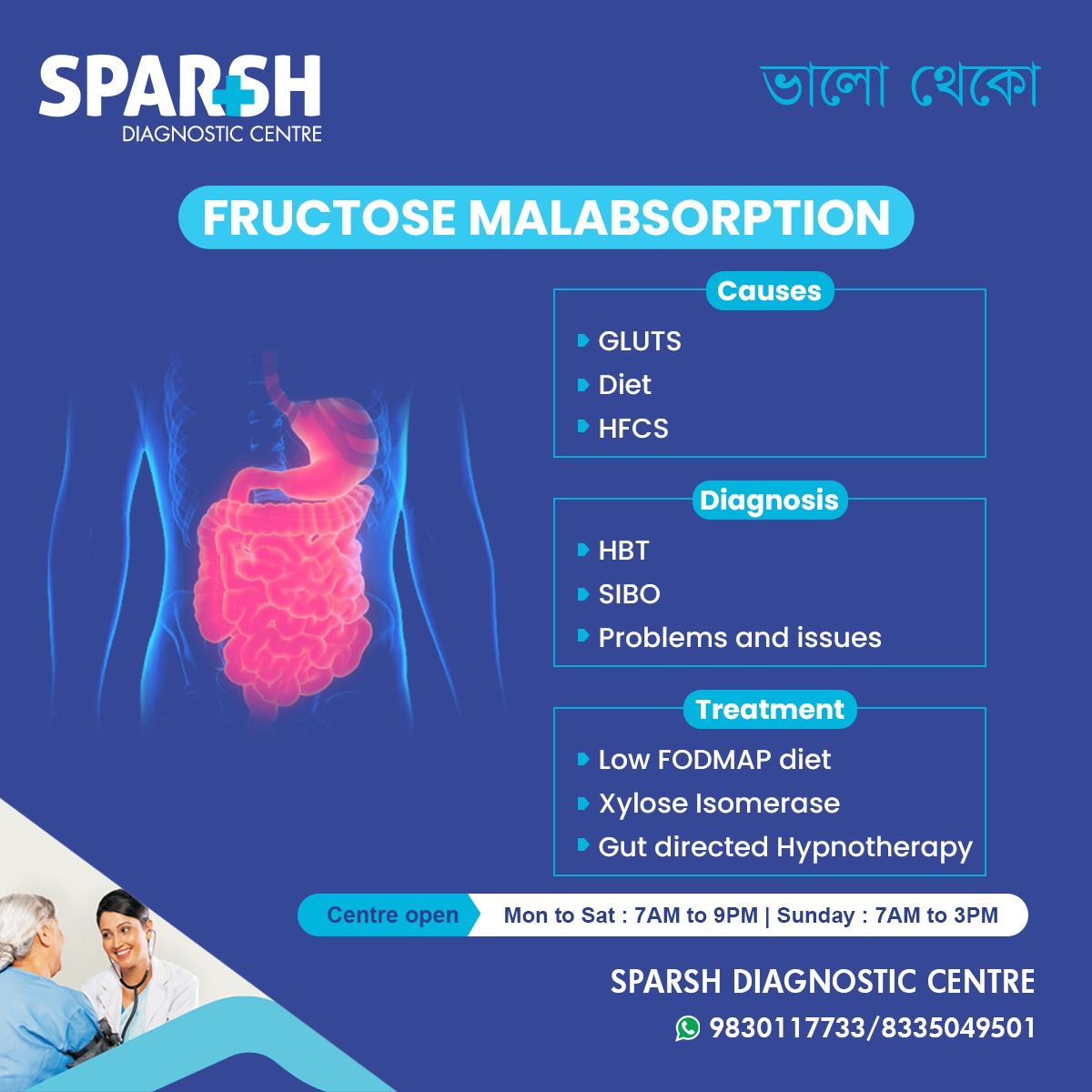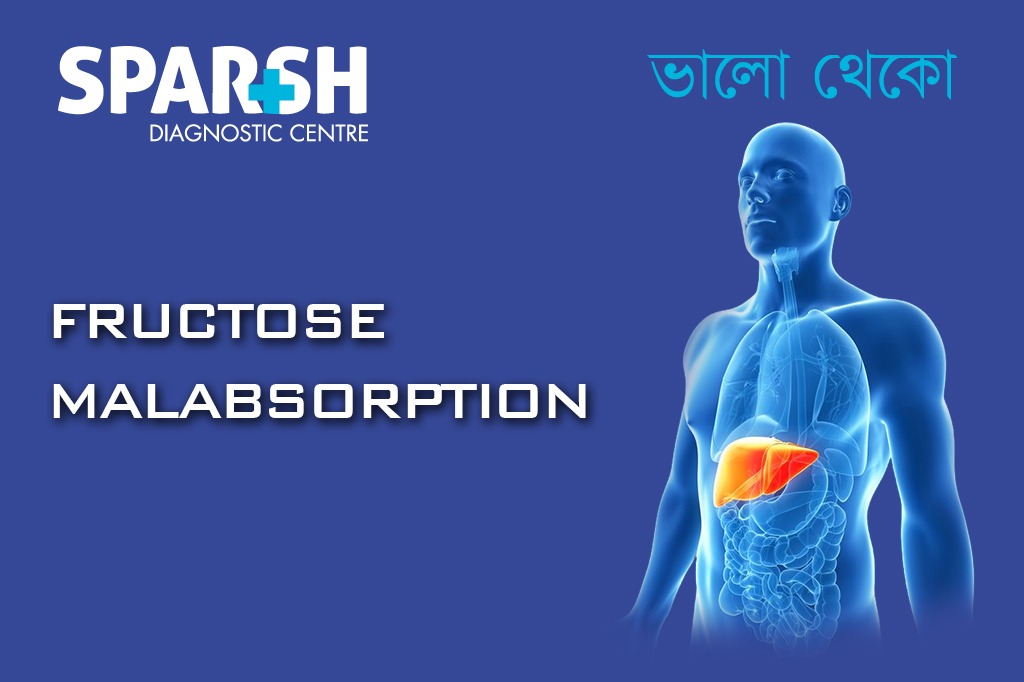Fructose is a natural sugar found in fruits, vegetables, honey, and many processed foods. While most people digest fructose easily, some individuals experience difficulty absorbing it in the small intestine. This condition is known as Fructose Malabsorption.
When fructose isn’t absorbed properly, it passes into the large intestine, where bacteria ferment it, producing gases like hydrogen, methane, and carbon dioxide. This leads to uncomfortable digestive symptoms such as bloating, diarrhea, abdominal pain, and flatulence.
Fructose Malabsorption is often confused with other gastrointestinal disorders like Irritable Bowel Syndrome (IBS), lactose intolerance, or Small Intestinal Bacterial Overgrowth (SIBO). Understanding this condition is crucial to getting the right diagnosis and treatment.
What is Fructose Malabsorption?
Fructose Malabsorption, sometimes called Dietary Fructose Intolerance (DFI), is a digestive disorder where the small intestine is unable to properly absorb fructose. This is different from Hereditary Fructose Intolerance (HFI), a rare genetic condition caused by enzyme deficiency.
In dietary fructose malabsorption, the issue lies with transporters in the intestinal lining that normally absorb fructose into the bloodstream. When these transporters don’t function efficiently, unabsorbed fructose travels to the colon, triggering gastrointestinal symptoms.

Causes of Fructose Malabsorption
Several factors contribute to fructose malabsorption:
GLUT-5 Transporter Issues
Fructose absorption primarily depends on a transporter protein called GLUT-5 located in the small intestine. If GLUT-5 is underactive or reduced in number, fructose absorption decreases.
Dietary Factors
Consuming large amounts of fructose, especially from high-fructose foods and drinks, overwhelms the absorption capacity.
High Fructose Corn Syrup (HFCS)
Widely used in processed foods and beverages, HFCS has a high fructose-to-glucose ratio, making it harder to digest.
Gut Health Imbalances
Conditions like Small Intestinal Bacterial Overgrowth (SIBO) can impair fructose absorption.
Co-existing Gastrointestinal Disorders
People with IBS, celiac disease, or inflammatory bowel disease (IBD) are more likely to experience fructose malabsorption.
Symptoms of Fructose Malabsorption
The severity of symptoms depends on the amount of fructose consumed and the individual’s tolerance. Common symptoms include:
Bloating and gas due to bacterial fermentation in the colon.
Abdominal pain or cramps often after meals.
Diarrhea (sometimes alternating with constipation).
Excessive flatulence and discomfort.
Nausea after fructose-rich meals.
Fatigue, mood changes, and brain fog, which may occur due to altered gut-brain interaction.
In children, symptoms may also include irritability, poor appetite, and failure to thrive if undiagnosed.
Diagnosis of Fructose Malabsorption
Diagnosing fructose malabsorption requires specialized testing, as symptoms overlap with other digestive conditions. Common diagnostic methods include:
Hydrogen Breath Test (HBT)
The patient drinks a fructose solution, and breath samples are analyzed for hydrogen or methane gases. High levels indicate poor fructose absorption.
Small Intestinal Bacterial Overgrowth (SIBO) Testing
Since SIBO can mimic fructose malabsorption symptoms, ruling it out is essential.
Symptom Analysis and Dietary History
Keeping a food diary to track symptoms after fructose-containing meals helps identify patterns.
Elimination Diets
Temporarily removing high-fructose foods and reintroducing them helps confirm intolerance.
Foods High in Fructose
Patients with fructose malabsorption often struggle with foods containing high levels of fructose or an imbalance between fructose and glucose. Common high-fructose foods include:
Apples, pears, mangoes, cherries, and watermelon
Honey and agave syrup
High-fructose corn syrup (found in sodas, candies, baked goods)
Fruit juices and sweetened drinks
Certain vegetables like asparagus and artichokes
Treatment Options for Fructose Malabsorption
While there is no cure, proper dietary management and supportive therapies can significantly reduce symptoms.
1. Low FODMAP Diet
A diet low in Fermentable Oligo-, Di-, Mono-saccharides, and Polyols (FODMAPs) helps reduce symptoms.
Foods low in FODMAPs are easier to digest and don’t trigger excessive fermentation in the gut.
2. Enzyme Supplementation (Xylose Isomerase)
Xylose isomerase is an enzyme that converts fructose into glucose, making it easier to absorb.
Available as dietary supplements, it can help people enjoy some fructose-containing foods without discomfort.
3. Gut-Directed Hypnotherapy
Hypnotherapy has been shown to improve symptoms of functional gut disorders by calming the gut-brain axis.
4. Gradual Reintroduction
Instead of complete avoidance, patients can slowly reintroduce small amounts of fructose to build tolerance.
5. Probiotics and Gut Health Support
Restoring healthy gut bacteria may reduce symptoms, especially in cases associated with SIBO.
6. Dietitian-Guided Nutrition Plan
Consulting a dietitian ensures proper nutrient intake while managing restrictions.
Living with Fructose Malabsorption
Managing fructose malabsorption requires lifestyle adjustments:
Read food labels carefully to avoid hidden sources of HFCS.
Choose glucose-rich foods (glucose helps fructose absorption when consumed together).
Stay hydrated to manage diarrhea.
Plan meals mindfully, focusing on whole foods and avoiding processed snacks.
Work with a healthcare provider to monitor gut health and prevent nutritional deficiencies.
With the right approach, most people can live symptom-free without giving up all fruits and natural sugars.
Fructose Malabsorption vs. Hereditary Fructose Intolerance (HFI)
It’s important to distinguish between these two conditions:
Fructose Malabsorption:
A digestive issue due to poor absorption.
Causes gastrointestinal discomfort.
Managed with diet modifications.
Hereditary Fructose Intolerance (HFI):
A rare genetic condition caused by a missing liver enzyme (aldolase B).
Can lead to serious complications like liver and kidney damage.
Requires lifelong avoidance of fructose, sucrose, and sorbitol.
Frequently Asked Questions (FAQ)
1. What is the difference between fructose malabsorption and fructose intolerance?
Fructose malabsorption refers to difficulty absorbing fructose in the small intestine, while hereditary fructose intolerance is a genetic disorder caused by enzyme deficiency.
2. Can fructose malabsorption be cured?
No, it cannot be cured, but symptoms can be effectively managed with diet, enzyme supplements, and gut-directed therapies.
3. Is fructose malabsorption the same as IBS?
No, but they share similar symptoms. Many IBS patients also have fructose malabsorption, and a low FODMAP diet helps both conditions.
4. Which fruits are safe to eat with fructose malabsorption?
Fruits with a balanced glucose-to-fructose ratio, such as bananas, strawberries, blueberries, oranges, and kiwis, are usually well-tolerated.
5. How is fructose malabsorption diagnosed?
The hydrogen breath test (HBT) is the most reliable method, alongside dietary tracking and symptom evaluation.
6. Can children have fructose malabsorption?
Yes, children can experience it. Symptoms often include bloating, gas, diarrhea, and irritability. Proper diagnosis and diet management are crucial.
7. Is honey safe for people with fructose malabsorption?
No, honey is high in fructose and usually triggers symptoms. It is best avoided.
Fructose malabsorption is a common but underdiagnosed digestive disorder that can cause significant discomfort if left unmanaged. By identifying trigger foods, making dietary adjustments, and seeking professional guidance, patients can dramatically improve their quality of life.
At Sparsh Diagnostic Centre, we specialize in advanced diagnostic tests and personalized treatment plans to help individuals manage fructose malabsorption effectively. If you’re experiencing persistent digestive issues, book your consultation today.
#BhaloTheko
Disclaimer:
No content on this site, regardless of date, should ever be used as a substitute for direct medical advice from your doctor or other qualified clinician.

![]()





